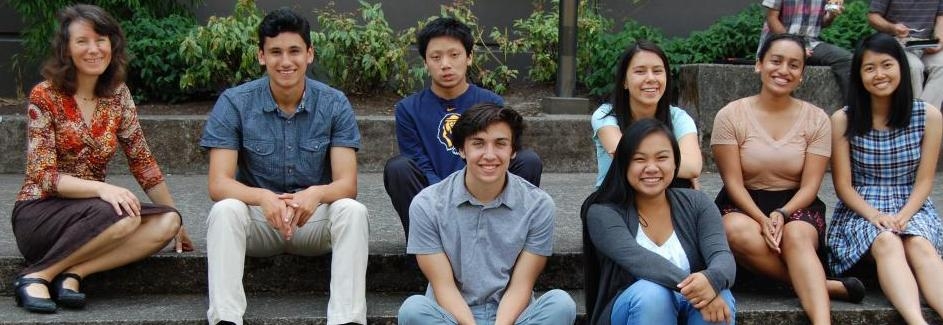Bicycle and pedestrian database grows, with help from high schoolers

Seven dedicated students spent their summer days in TREC’s offices at PSU this year, working to transform the Bike-Ped Portal project from a dream into a reality.
TREC already houses Portal, a vast collection of Portland-area traffic and transit data, and NITC researchers saw a need for a database on the national scale for non-motorized transportation modes.
Research associate Krista Nordback launched the NITC pooled-fund project, Online Non-motorized Traffic Count Archive, with co-investigator Kristen Tufte in the spring of 2014. A year ago, Bike-Ped Portal was little more than an idea.
Now it contains roughly four million individual records of bicycle, pedestrian and even equestrian movements in five states.
High school interns Jolene Liu, Tomas Ramirez, Tara Sengupta, Gautum Singh, Kim Le, Max Fajardo and Kimberly Kuhn worked full time for weeks in order to convert piles of unsorted documentation into usable formats.
Nordback engaged the team of interns through Saturday Academy, a program affiliated with the University of Portland which connects motivated high school students with STEM internships.
“I call them the data wranglers,” Nordback said. Their primary task was to sort, organize, and enter the information into the database.
This was no easy feat, since the bicycle and pedestrian data that Nordback and her team collected came from a wide variety of sources.
Some were aggregate pedestrian counts gathered by people with clipboards, others were collected through automatic count systems of varying durations. No two sets of data were alike, and the challenge was to take all of that information and make it accessible.
Kuhn, who is also working on e-bike research with TREC’s in-house e-bike researcher John MacArthur, worked on untangling the data from the City of Portland and from Austin, Texas.
Ramirez worked on data from Bend, Oregon, reformatting it and recording the context in which it was collected. Sengupta did the same for Eugene, Oregon, and Le was in charge of data from Metro and Olympia, Washington.
Ramirez also started inventory on one of the most exciting data acquisitions of the project: manual count data from the National Bicycle and Pedestrian Documentation Project, a joint effort of Alta Planning & Design and the Institute of Transportation Engineers (ITE) which boasts a wealth of data going back to 2004.
Meanwhile, Singh was assigned to Boulder, Colorado, which had one of the largest data samples available, and Fajardo worked on shaping up data from the Oregon Department of Transportation.
Fajardo and Singh were also dubbed by Nordback as “The Python Team.” They took obscure data in older formats and wrote Python scripts to clean it up and convert it into a format that made sense for Bike-Ped Portal.
Liu, who worked on the project with Nordback last summer and co-authored the paper for TRB’s national conference, returned this year to help coordinate the other interns and manage the project’s workflow. She also handled a large portion of the Boulder data, which spans from 1998 to 2014 and is the longest continuous collection of bicycle data in the country.
Each of the interns will present a summary of their work at the Apprenticeships in Science and Engineering Symposium on Friday, August 21 at the University of Portland.
Their contribution to the Bike-Ped Portal database has been invaluable, as there is now a centralized place where planners and researchers can find active transportation counts much more easily than ever before.
"When we start sharing across boundaries, across jurisdictional lines, having the data all in one place - that is when we can be really useful,” Nordback said.
Next steps for Bike Ped Portal include query functions and a map interface, to make the data even more accessible and comprehensible for practitioners.
The interns' work was sponsored by NITC and IBM, and supported by Alta Planning + Design and the Saturday Academy.
